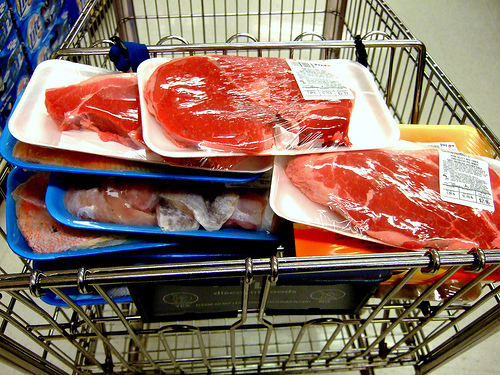 Photo: This Year’s Love In a New York Times op-ed, Mark Bittman flagged this story from the Daily Livestock Report that notes the USDA is now projecting that U.S meat consumption will continue to drop, representing a 12 percent decrease from 2007. While American beef consumption has been dropping for some time, the story says chicken and even pork are now suffering a similar fate.
Photo: This Year’s Love In a New York Times op-ed, Mark Bittman flagged this story from the Daily Livestock Report that notes the USDA is now projecting that U.S meat consumption will continue to drop, representing a 12 percent decrease from 2007. While American beef consumption has been dropping for some time, the story says chicken and even pork are now suffering a similar fate.
The Daily Livestock Report, a trade paper, pins the blame on rising feed prices (thank you, ethanol), growing exports — which reduce domestic supply — and, remarkably, “the fruition of 30-40 years of government policy.” The paper continues:
If the federal government and its agencies decide to wage war on a product and continue that war for long enough, it will eventually have an impact. And the feds have indeed waged war on meat protein consumption for many years.
Bittman rightly considers this claim ludicrous. As he points out, the government is doing everything it can to boost meat consumption, from refusing to enforce laws that would make it harder for factory farms to operate at the scale they now do, to purchasing billions of dollars in “surplus” chicken to feed to schoolchildren. I would also add last year’s proposed ag-gag laws to his list, i.e., the government attempts to keep prying eyes away from the abuses that appear to be endemic to industrial agriculture (meanwhile, the bill that failed in Florida last spring was just re-introduced in December).
What really struck me was how this latest news mirrors the trend in consumer attitudes on meat-eating uncovered by the food industry’s own market research. It turns out that since 2007, there has also been a 12 percent drop in the number of consumers who report that they have “no problem” eating meat or dairy (a bare majority of respondents currently feel that way).
This interesting correlation does support Bittman’s speculation as to the cause of the drop in consumption. As he put it, “conscious decisions are being made by consumers,” and they aren’t just reacting to price signals like so many automatons. Whether it’s the Meatless Monday campaign, the Mercy for Animals whistleblower videos, or simply the growing understanding that meat does not have to sit at the center of the plate — consumer attitudes are changing. And not a moment too soon.
I say that not only because meat-eating at the rate Americans currently practice it isn’t sustainable from an environmental or a climate standpoint (even Al Gore says so), but also because the human cost is beyond belief.
Earlier this week, The Nation published a must-read piece by David Bacon on the link between the North American Free Trade Agreement (NAFTA), immigration, and the pork-producing behemoth Smithfield. In short, NAFTA, combined with the lax U.S. protections for workers (even when they’re unionized), has created a bizarre and corrosive system. The result: Smithfield’s massive increases in pork exports to Mexico that occured in the wake of NAFTA’s passage put thousands of Mexican butchers and pig farmers out of work and destroyed rural economies. Bacon reports that the total jobs lost due to the explosion in pork imports exceed 100,000.
As a result of this economic devastation, those very same farmers and butchers have decamped to the U.S. — specifically North Carolina — where they are hired as undocumented workers to labor in Smithfield pork slaughterhouses. Bacon found strong evidence, despite the company’s denial, that Smithfield specifically hired undocumented workers as more pliant replacements for African- and Native-American workers who refused the increasingly dangerous, low-paid, and OSHA-flouting practices of its slaughterhouses. According to residents interviewed by Bacon, entire Mexican villages have ended up in the Tar Heel State working for Smithfield.
And while abuses in the food processing industry are easy to find — this Mother Jones investigation into a single Hormel processing plant is utterly shocking — Bacon draws a much starker picture in many ways. As he describes it, we have an industrial meat production system — encouraged by our larger economic policies — that immiserates virtually anyone it touches. From those who work in CAFOs or slaughterhouses, to those who live near them or have seen their families torn apart by the industry in one way or another — no one is immune.
So, while I don’t have visions of a Vegan America, I do hope we continue decreasing our meat consumption in this country — and in the rest of the developed world, for that matter. The goal as I see it isn’t just that we move toward a less-intensive system that’s more humane for the animals we consume, but also a system that’s humane for the people who are, as things stand right now, being consumed by it.

